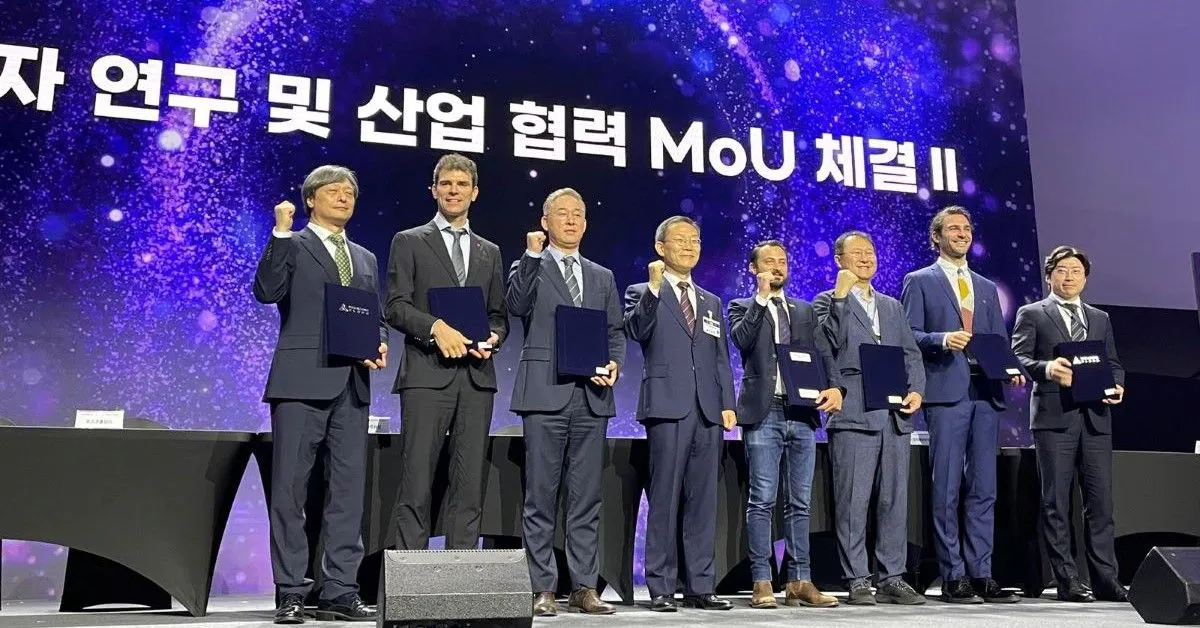South Korean steel company, POSCO Holdings, is partnering with French firm PASQAL and Korean company Qunova Computing to develop quantum computing technologies. The collaboration aims to develop innovative solutions such as optimising eco-friendly steelmaking processes and developing secondary battery materials. Quantum computers, which can perform calculations faster than conventional computers, are expected to solve major human challenges in energy, food, health, and other sectors. PASQAL, co-founded by 2022 Nobel Prize in Physics winner Alain Aspect, specialises in quantum computer development. Qunova Computing, a Korean start-up, excels in developing quantum computing software.
PASQAL, co-founded by Alain Aspect, a 2022 Nobel Prize in Physics winner and expert in quantum computer hardware and software, specialises in quantum computer development. Qunova Computing, the first quantum computer venture company in Korea, was created by a KAIST teacher start-up program and has expertise in developing quantum computing software for new materials.
Quantum AI Algorithms and Eco-friendly Steelmaking
POSCO Holdings’ New Experience of Technology Hub plans to conduct research and development of quantum AI algorithms in collaboration with PASQAL. The two companies aim to focus their efforts on developing innovative technologies, such as optimising the eco-friendly steelmaking process and developing secondary battery materials. This will be achieved by combining POSCO Group’s AI technology with PASQAL’s quantum computer technology.
Quantum computers can perform faster calculations than conventional computers by using quantum physical properties that cannot be explained by classical physics. This includes particles having two properties simultaneously and two particles correlated in the same quantum state, even when separated by long distances.
Quantum Computers: The Future of Problem Solving
Once commercially developed, quantum computers are expected to be a significant technology that will not only solve human energy, food, and health problems that supercomputers cannot solve, but also bring innovation in various fields such as automobiles, chemistry, medicine, logistics, and finance. Georges-Oliver Reymond, CEO of PASQAL, stated that quantum computers have the potential to implement computing tasks that would be intractable with classical means.
Kim Ji-yong, head of POSCO Holdings New Experience of Technology Hub, emphasised the potential benefits of securing quantum computing technology through cooperation with PASQAL. The technology could be utilised for the group’s main business, steelmaking, and eco-friendly future material technology development.
Regular Technology Exchanges and Future Plans
The two companies plan to hold regular technology exchanges in the future and strengthen their technological competitiveness by solving problems to help achieve a sustainable future for humankind. POSCO Holdings consortium was selected as a national project in April by contesting the National Research Foundation of Korea’s Quantum Computing-based Quantum advantage Challenge Research Project.
The consortium plans to develop technologies that increase the accuracy of material characteristics analysis such as solid electrolytes and reduce the time required by using quantum computers. This project will be funded by the Ministry of Science and ICT for three years.
POSCO Group, established in 1968 as a steel company, transitioned to a holding company system centered on POSCO Holdings in the previous year. The group has selected seven key projects to discover future growth engines and foster its business portfolio. These include steel, rechargeable battery materials, lithium and nickel, hydrogen, energy, construction/infrastructure, and food (Agri-Bio).
PASQAL, founded in 2019, builds quantum computers from ordered neutral atoms in 2D and 3D arrays to bring a practical quantum advantage to its customers and address real-world problems. The company has secured more than €140 million in financing to date.
“Quantum computers have the potential to implement computing tasks that would be intractable with classical means,” said Georges-Oliver Reymond, CEO of PASQAL.
Kim Ji-yong, head of POSCO Holdings New Experience of Technology Hub, emphasized, “We expect to secure quantum computing technology through cooperation with PASQAL and utilize quantum computing technology for the group’s main business, steelmaking, and eco-friendly future material technology development.”
Quick Summary
South Korean steel company, POSCO Holdings, is partnering with French firm PASQAL and Korean company Qunova Computing to develop quantum computing technologies, focusing on optimising eco-friendly steelmaking processes and developing secondary battery materials. Quantum computers, which can perform faster calculations than conventional computers, are expected to bring innovation in various fields and solve pressing global challenges that current supercomputers cannot.
- South Korean steel company, POSCO Holdings, is collaborating with French company PASQAL and Korean company Qunova Computing to develop quantum computing technologies.
- Quantum computers, capable of performing calculations beyond existing supercomputers, are expected to address significant global challenges upon commercial development.
- PASQAL, co-founded by 2022 Nobel Prize in Physics winner Alain Aspect, specialises in quantum computer development. Qunova Computing, a Korean venture, excels in developing quantum computing software for new materials.
- POSCO and PASQAL plan to jointly research and develop quantum AI algorithms, focusing on innovative technologies like optimising eco-friendly steelmaking processes and developing secondary battery materials.
- Quantum computers utilise quantum physical properties, such as particles having two properties simultaneously, to perform faster calculations than conventional computers.
- Georges-Oliver Reymond, CEO of PASQAL, and Kim Ji-yong, head of POSCO Holdings New Experience of Technology Hub, emphasise the potential of quantum computing in various fields, including steelmaking and eco-friendly material technology.
- The POSCO Holdings consortium was selected for a national project by the National Research Foundation of Korea, receiving 2.75 billion won from the Ministry of Science and ICT for three years to develop technologies that increase the accuracy of material characteristics analysis.
- POSCO Group aims to become a leading supplier of eco-friendly future materials, while PASQAL, founded in 2019, has secured more than €140 million in financing to date.
Read More

